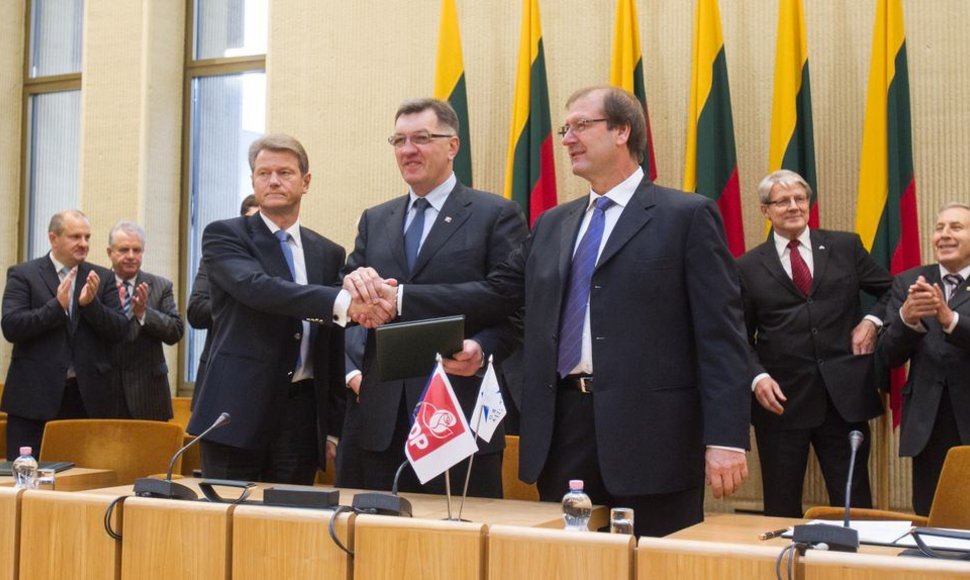"Respecting the will of voters, seeking to ensure economic and social stability in the country, supporting socially-oriented policies and increasing wellbeing of people, the Social Democratic Party of Lithuania, the Labor Party, and the Order and Justice Party agree to work for the welfare of the people," the document reads.
The partners agreed to form a coalition government, coordinate the parties' programs and to jointly agree on leadership of the Seimas and Seimas committees.
Under the coalition agreement, Algirdas Butkevičius of the social democrats will be prime minister, and the Labor Party will nominate a candidate for the Seimas speaker. The latter's name is not included in the document.
The partners also agree to coordinate foreign and internal political strategies, urgent actions, state administration reforms, and other important issues.
The coalition agreement says other parties might join the agreement under a separate document.
The coalition partners will set up a coordination council to coordinate coalition work on a parity basis and will delegate three representatives each.
Contrary to previous agreements, the Order and Justice party, and not the Labor Party, will be in charge of the Ministry of the Interior. Meanwhile, the Labor Party will take over the Ministry of Energy.
The changes were announced following social democratic leader Algirdas Butkevičius' meeting with President Dalia Grybauskaitė. He told journalists on Tuesday these changes were final but denied that they were pushed by the president.
"Discussions with the president were broad and extensive but definitely there was no such demand," Butkevičius said after the three parties signed a coalition agreement.
In his words, the change was made "for the parties not to be disadvantaged in terms of the importance of ministries."
"The Ministry of Energy was rated with a half of a point, and the Ministry of the Interior was one point," Viktor Uspaskich, leader of the Labor Party, said.
Rolandas Paksas, leader of the Order and Justice Party, said his party did not feel any disadvantage, and the changes were swiftly accepted.
"I understand that the prime minister and the coalition partners need to start working as soon as possible, and the sooner we start working, the sooner people start seeing the results of our work, the better it is for all of us," Paksas said.
The coalition partners still don’t discount the possibility of the Electoral Action of Poles in Lithuania (EAPL) joining the freshly-formed coalition. Uspaskich even said his party might give the party one of his ministerial positions.
"We'll continue negotiations. The coalition will put every effort for the coalition to be stronger," he said.
"I think Poland is our strategic partner. And the EAPL's participation would facilitate strategic, even energy, projects we need to coordinate with our neighbor and stick to certain positions at EU Councils. In the past, ahead of Council meetings, the position would often be coordinated not only among Lithuania, Latvia, and Estonia but with Poland as well," Butkevičius said.
Following a party council meeting on Monday, the EAPL demanded the same conditions for joining the ruling coalition as the Order and Justice Party has.
EAPL representative Leonard Talmont said on Tuesday his party was waiting for an invitation to join the new coalition.
"We are waiting for the coalition partners to agree, and what they are going to offer us," he told BNS.
The coalition partners also spoke positively about President Dalia Grybauskaitė's decision to turn to the Constitutional Court over alleged election violations.
"I think the Constitutional Court's ruling will put a period, and there will be no speculations as to whether violations happened or not," Uspaskich said.
"The president has such a right, such an obligation. And it’s natural that she acted like that," Paksas said.
Under the coalition agreement, the Social Democratic Party of Lithuania will nominate a candidate for prime minister and get seven ministries: Finance, Transport and Communications, Economy, National Defense, Health, Foreign Affairs, and Justice.
The Labor Party will control five ministries: Agriculture, Energy, Education and Science, Social Security and Labor, and Culture.
The Order and Justice Party will take over the Ministries of Environment and the Interior.
The three parties will have 78 seats in the 141-seat Seimas.


















